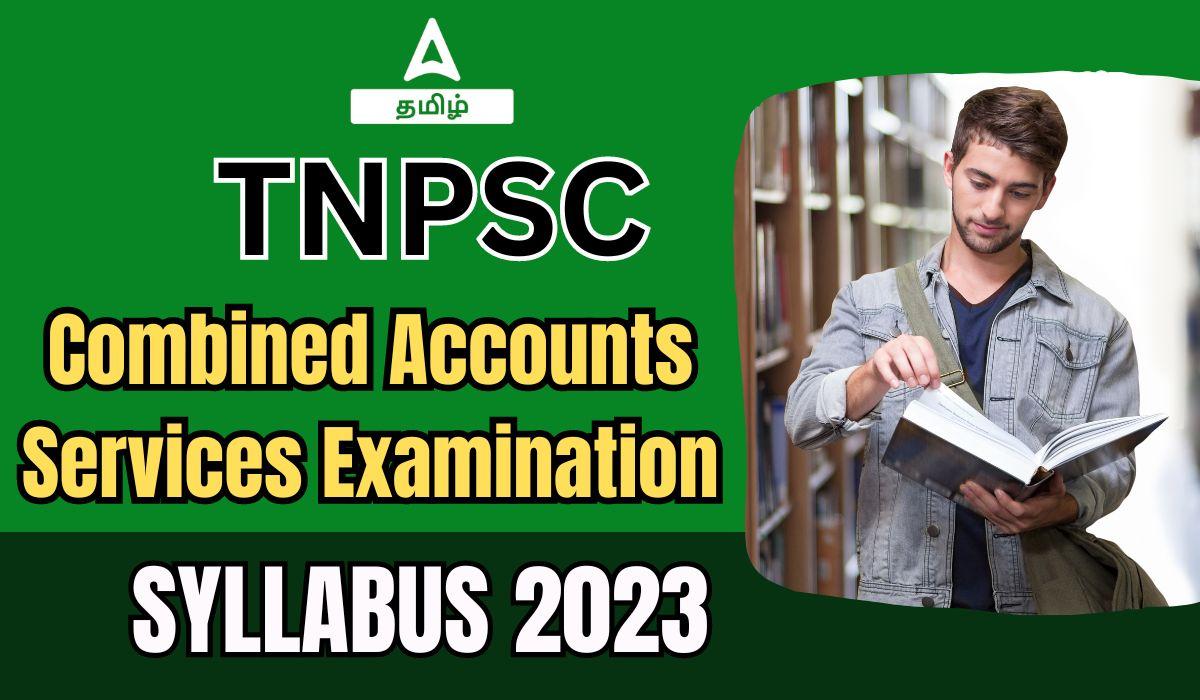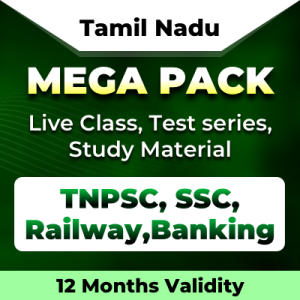Table of Contents
TNPSC CASE பாடத்திட்டம் 2023 : தமிழ்நாடு அரசுப் பணியாளர் தேர்வாணையம் 52 ஒருங்கிணைந்த கணக்குப் பணிகள் பதவிகளுக்கான (CASE) நேரடி ஆட்சேர்ப்புக்கு தகுதியானவர்களிடமிருந்து விண்ணப்பங்கள் வரவேற்கப்படுகின்றன. TNPSC CASE பாடத்திட்டம் 2023 தேர்வுக்கு தயாராவதற்கு முன், அதன் பாடத்திட்டம் பற்றி ஆர்வமுள்ள விண்ணப்பதாரர்கள் அறிந்திருக்க வேண்டும். விண்ணப்பதாரர்கள் TNPSC CASE பாடத்திட்டம் 2023 PDF மற்றும் தேர்வு முறை விவரங்களை இந்த கட்டுரையில் பார்க்கலாம்.
| TNPSC CASE பாடத்திட்டம் 2023 | |
| நிறுவனம் | தமிழ்நாடு அரசு பணியாளர் தேர்வாணையம் |
| பதவி | ஒருங்கிணைந்த கணக்குப் பணிகள் |
| காலியிடம் | 52 |
| வேலை இடம் | தமிழ்நாடு |
| ஆன்லைனில் விண்ணப்பிப்பதற்கான தொடக்க தேதி | 09 நவம்பர் 2023 |
| ஆன்லைனில் விண்ணப்பிப்பதற்கான கடைசி தேதி | 08 டிசம்பர் 2023 |
விண்ணப்பிக்கும் முறை
|
ஆன்லைன் |
|
அதிகாரப்பூர்வ இணையதளம் |
https://www.tnpsc.gov.in/ |
TNPSC CASE பாடத்திட்டம் 2023
TNPSC CASE 2023 பாடத்திட்டத்தை சரிபார்க்கவும்.
ANNEXURE – I
Paper-I
SYLLABUS FOR EXAMINATION (CBT Method)
Fundamentals of Financial Accounting Cost Accounting Taxation and other Laws (Intermediate Standard)
| Fundamentals of Financial Accounting Cost Accounting Taxation and other Laws (Intermediate Standard) |
|
| UNIT-I | ACCOUNTING a) Accounting Standards (old) 2,10,12 and 16 b) Accounting for Cooperative Societies c) Branch and Departmental Accounts (including foreign branches) d) Accounting for non-profit organisations and incomplete records e) Computerised Accounting System |
| UNIT-II | AUDITING a) Nature and scope and significance of auditing b) Audit Engagement, Audit Programme, Audit working papers, Audit note book audit evidence and audit report c) Internal check, internal control and internal audit – industry specific d) Auditing of difference types of undertaking – education, hospitals, cooperative societies, trusts, municipalities |
| UNIT-III | FINANCIAL MANAGEMENT a) Meaning – objectives – scope of financial management b) Tools for Financial Analysis – Ratio, Cash flow analysis c) Analysis and Interpretation of Financial Statements d) Investment decisions – ARR, Pay back, NPV, IRR, PI e) Cost of Capital Structure and Leverages f) Working Capital Management – Financing – Cash, Inventory, Receivables and Payables |
| UNIT-IV | DIRECT TAXATION a) Heads of Income and Computation of Total Income under various heads b) TDS/TCS/Advance Tax c) Taxation as applicable to Government undertaking and Cooperative Societies. |
| UNIT-V | INDIRECT TAXATION a) Canons of Taxation b) Goods and Services Tax (GST) a. CGST-SGST-IGST-Cess b. Registration – Supply – Time of Supply – Value of Supply – Place of Supply – Input tax credit – Reverse Charge Mechanism (RCM) – Payment of Taxes. c) Filing of GST periodic returns |
| UNIT-VI | COMMERCIAL LAW, INDUSTRIAL LAW & COMPANY LAW a) Indian Contract Act b) Sale of Goods Act c) Negotiable Instrument Act d) Factories Act, Payment of Gratuity Act e) Employees Provident Fund Act 1952 f) Employees State Insurance Act 1948 g) Payment of Bonus Act 1965, Minimum Wages Act 1948 h) Tamil Nadu Tender Transparency Act, 1998 |
| UNIT-VII | COST ACCOUNTING: PRIME COST AND OVERHEADS i) Material Cost a. Purchase procedures, ledgers and forms (MRN, GRN etc.) b. Inventory levels management c. Stores ledger under FIFO, Weighted average, retail price d. Physical stock taking and inventory reconciliation e. Wastage and shortage ii) Labour a. Remuneration methods b. Measuring production and productivity c. Incentive Schemes: Halsey, Rowan, Taylor d. Labour Turnover iii) Overhead a. Cost grouping, allocation and apportionment b. Treatment of under and over absorption c. Machine hour rate computation |
| UNIT-VIII | COST ACCOUNTING: BOOKKEEPING AND METHODS a) Costing accounting records, Ledgers, Cost statements b) Items excluded from cost and normal and abnormal, terms /cost c) Integral accounts d) Reconciliation of cost accounting records with financial accounts e) Process, job, contract, and Batch costing f) Service costing: hospital, transport, hotel etc. |
| UNIT-IX | COST ACCOUNTING: TECHINIQUES i) Marginal costing a. CVP analysis b. Break even point and Margin of safety c. Break even chart d. Cost indifference point e. Key factor analysis ii) Standard costing and variance analysis a. Material b. Labour c. Variable Overheads d. Fixed Overheads e. Sales variances f. Sales margin variances |
| UNIT-X | BUDGET AND BUDGETARY CONTROL a) Concepts, Types of Budgets b) Budgetary Control Vs Standard Costing c) Advantages and Limitations d) Preparation of Various Budgets e) Zero Base Budgeting |
Financial Cost Accountancy (PG Degree Standard)
| Financial Cost Accountancy (PG Degree Standard) | |
| UNIT-I | ACCOUNTING
|
| UNIT-II | AUDITING
|
| UNIT-III | FINANCIAL MANAGEMENT
|
| UNIT-IV | TAXATION
|
| UNIT-V | COMMERCIAL LAW, INDUSTRIAL LAW & COMPANY LAW
|
| UNIT-VI | MANAGEMENT ACCOUNTING Introduction to Management Accounting – Relationship between Management accounting and cost accounting- Decision Making tools Analysis and Interpretation of Financial Statements Learning Curve – concepts and its application |
| UNIT-VII | Cost Management
|
| UNIT-VIII | DECISION MAKING TECHNIQUES
|
| UNIT-IX | PERFORMANCE EVALUATION & IMPROVEMENT TOOLS
|
| UNIT-X | BUSINESS VALUATION
|
Paper-II SYLLABUS FOR EXAMINATION (CBT Method)
TAMIL ELIGIBILITY TEST (SSLC STANDARD)
கட்டாய தமிழ்மமாழி தகுதித் தேர்விற்கான பாடத்திட்டம்
பத்தாம் வகுப்பு தரம்
- பிரித்தெழுதுதல் / சேர்த்தெழுதுதல்.
- எதிர்ச்சொல்லை எடுத்தெழுதுதல்.
- பொருந்தாச் சொல்லைக் கண்டறிதல்.
- பிழைதிருத்தம் (i) சந்திப்பிழையை நீக்குதல் (ii) மரபுப்பிழைகள், வழுவுச் சொற்களை நீக்குதல் /பிறமொழிச் சொற்களை நீக்குதல்.
- ஆங்கிலச் சொல்லுக்கு நேரான தமிழ்ச் சொல்லை அறிதல்
- ஒலி மற்றும் பொருள் வேறுபாடறிந்து சரியான பொருளையறிதல்.
- ஒரு பொருள் தரும் பல சொற்கள்.
- வேர்ச்சொல்லைத் தேர்வு செய்தல்.
- வேர்ச்சொல்லைக் கொடுத்து / தொழிற்பெயரை / உருவாக்கல். வினைமுற்று, வினையெச்சம், வினையாலணையும் பெயர்,
- அகரவரிசைப்படி சொற்களை சீர் செய்தல்.
- சொற்களை ஒழுங்குப்படுத்தி சொற்றொடராக்குதல்
- இரு வினைகளின் பொருள் வேறுபாடு அறிதல்.(எ.கா.) குவிந்து-குவித்து
- விடைக்கேற்ற வினாவைத் தேர்ந்தெடுத்தல்
- எவ்வகை வாக்கியம் எனக் கண்டெழுதுதல் – தன்வினை, பிறவினை, செய்வினை, செயப்பாட்டு வினை வாக்கியங்களைக் கண்டெழுதுதல்.
- உவமையால் விளக்கப்பெறும் பொருத்தமான பொருளைத் தேர்ந்தெழுதுதல்
- அலுவல் சார்ந்த சொற்கள் (கலைச்சொல்)
- விடை வகைகள்.
- பிறமொழிச் சொற்களுக்கு இணையான தமிழ்ச் சொற்களைக் கண்டறிதல் (எ.கா.) கோல்டு பிஸ்கட் – தங்கக்கட்டி.
- ஊர்ப் பெயர்களின் மரூஉவை எழுதுக (எ.கா.) தஞ்சாவூர் – தஞ்சை
- நிறுத்தற்குறிகளை அறிதல்.
- பேச்சுவழக்கு, எழுத்துவழக்கு (வாரான் – வருகிறான்).
- சொற்களை இணைத்து புதிய சொல் உருவாக்கல்
- பொருத்தமான காலம் அமைத்தல்(இறந்தகாலம், நிகழ்காலம், எதிர்காலம்).
- சரியான வினாச்சொல்லைத் தேர்ந்தெடு.
- சரியான இணைப்புச் சொல்(எனவே, ஏனெனில், ஆகையால், அதனால், அதுபோல).
- அடைப்புக்குள் உள்ள சொல்லைத் தகுந்த இடத்தில் சேர்க்க.
- இருபொருள் தருக.
- குறில் – நெடில் மாற்றம், பொருள் வேறுபாடு.
- கூற்று, காரணம் – சரியா? தவறா?
- கலைச் சொற்களை அறிதல் :-எ.கா. – Artificial Intelligence – செயற்கைநுண்ணறிவு Super Computer – மீத்திறன் கணினி
- பொருத்தமான பொருளைத் தெரிவு செய்தல்
- சொற்களின் கூட்டுப் பெயர்கள் (எ.கா.) புல் –புற்கள்
- சரியான தொடரைத் தேர்ந்தெடுத்தல்
- பிழைதிருத்துதல் (ஒரு-ஓர்)
- சொல் – பொருள் – பொருத்துக
- ஒருமை-பன்மைபிழை
- பத்தியிலிருந்து வினாவிற்கான சரியான விடையைத் தேர்ந்தெடு.
PAPER-II
Part –B
GENERAL STUDIES (DEGREE STANDARD)
| GENERAL STUDIES (DEGREE STANDARD) | |
| UNIT-I | GENERAL SCIENCE
(i) Scientific Knowledge and Scientific Temper – Power of Reasoning – Rote Learning vs Conceptual Learning – Science as a tool to understand the past, present and future. |
| UNIT-II | CURRENT EVENTS
(i) History-Latest diary of events-National symbols-Profile of States-Eminent personalities and places in news–Sports-Books and authors. |
| UNIT-III | GEOGRAPHY OF INDIA
(i) Location – Physical features – Monsoon, Rainfall, Weather and Climate-Water Resources – Rivers in India-Soil, Minerals and Natural Resources-Forest and Wildlife – Agricultural pattern. |
| UNIT–IV | HISTORY AND CULTURE OF INDIA
(i) Indus Valley Civilization – Guptas, Delhi Sultans, Mughals and Marathas-Age of Vijayanagaram and Bahmani Kingdoms-South Indian History. |
| UNIT-V | INDIAN POLITY
(i) Constitution of India-Preamble to the Constitution- Salient features of the Constitution- Union, State and Union Territory. |
| UNIT-VI | INDIAN ECONOMY
(i) Nature of Indian Economy –Five year plan models-an assessment –Planning Commission and NitiAyog. |
| UNIT-VII | INDIAN NATIONAL MOVEMENT
(i) National Renaissance –Early uprising against British rule – Indian National Congress – Emergence of leaders –B.R.Ambedkar, Bhagat Singh, Bharathiar, V.O.Chidambaranar, Jawaharlal Nehru, Kamarajar, Mahatma Gandhi, MaulanaAbulKalam Azad, ThanthaiPeriyar, Rajaji, Subash Chandra Bose, Rabindranath Tagore and others. |
| UNIT-VIII | History, Culture, Heritage and Socio-Political Movements in Tamil Nadu(i) History of Tamil Society, related Archaeological discoveries, Tamil Literature from Sangam Age till contemporary times. (ii) Thirukkural : (a) Significance as a Secular Literature (b) Relevance to Everyday Life (c) Impact of Thirukkural on Humanity (d) Thirukkural and Universal Values – Equality, Humanism, etc (e) Relevance to Socio-Politico-Economic affairs (f) Philosophical content in Thirukkural (iii) Role of Tamil Nadu in freedom struggle – Early agitations against British Rule – Role of women in freedom struggle. (iv) Evolution of 19thand 20thCentury Socio-Political Movements in Tamil Nadu – Justice Party, Growth of Rationalism – Self Respect Movement, Dravidian Movement and Principles underlying both these Movements, Contributions of ThanthaiPeriyar and Perarignar Anna. |
| UNIT–IX | Development Administration in Tamil Nadu
(i) Human Development Indicators in Tamil Nadu and a comparative assessment across the Country – Impact of Social Reform Movements in the Socio-Economic Development of Tamil Nadu. |
| UNIT-X | APTITUDE AND MENTAL ABILITY
(i) Simplification – Percentage – Highest Common Factor (HCF) – Lowest Common Multiple (LCM). |
TNPSC CASE பாடத்திட்டம் 2023 PDF
TNPSC CASE 2023 பாடத்திட்டத்தில் மேலே குறிப்பிடப்பட்ட தலைப்புகள் தொடர்பான கேள்விகள் இருக்கும். விண்ணப்பதாரர்கள் பாடத்திட்டத்தை முழுமையாக படித்து அதற்கேற்ப தயார் செய்து தேர்வில் நல்ல மதிப்பெண் பெற அறிவுறுத்தப்படுகிறார்கள். TNPSC CASE பாடத்திட்டத்தை PDF பதிவிறக்கம் செய்ய கீழே உள்ள இணைப்பை கிளிக் செய்யவும்.
TNPSC CASE பாடத்திட்டம் 2023 PDF
TNPSC CASE 2023 தேர்வு முறை
|
TNPSC ஒருங்கிணைந்த கணக்குப் பணிகள் பதவிகளுக்கான தேர்வு முறை |
||||
| Subject EXAMINATION in COMPUTER BASED TEST Method |
Duration
|
Maximum Marks | Minimum qualifying marks for selection |
|
| SCs, SC(A)s, STs, MBCs/ DCs, BC(OBCM)s & BCMs |
Others | |||
| For the Posts mentioned against Sl.Nos. 1 to 4 Paper I (Subject Paper ) (200 Questions) (300 marks) ( PG Degree standard) Financial Cost Accountancy |
3 Hours | 300 | 153 | 204 |
| For the Post mentioned against Sl.No. 5 Paper I (Subject Paper ) (200 Questions) (300 marks) (Intermediate standard) Fundamentals of Financial Accounting Cost Accounting Taxation and other Laws (Intermediate standard) |
||||
| Paper II Part-A Tamil Eligibility Test * (SSLC Std) (100 questions/ 150 marks) |
3 Hours | Note: *Minimum qualifying marks – 60 marks (40% of 150marks) Marks secured in Part-A of Paper-II will not be taken into account for ranking. |
||
| Part-B (General Studies) (Code No.003) (100 questions/ 150 marks) General Studies (Degree Std) -75 questions and Aptitude & Mental Ability Test (SSLC Std.) -25 questions |
150 | |||
| Interview and Records | 60 | |||
| Total | 510 | |||
**************************************************************************
| Adda247 TamilNadu Home page | Click here |
| Official Website=Adda247 | Click here |




